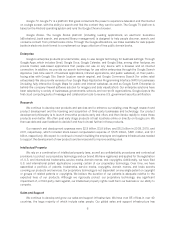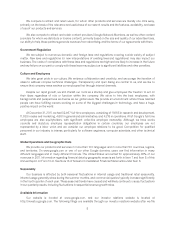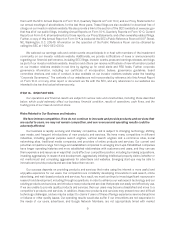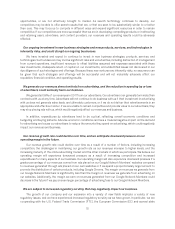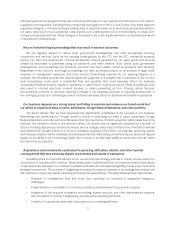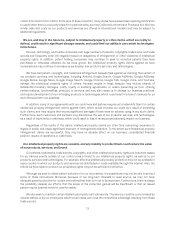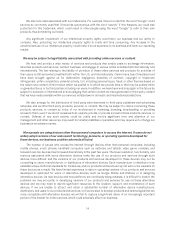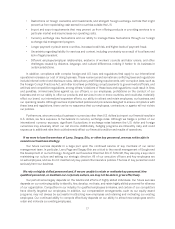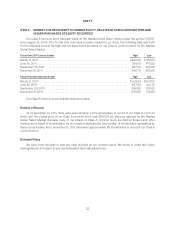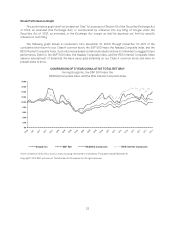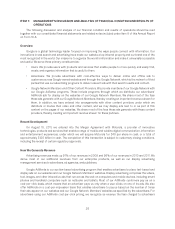Google 2011 Annual Report Download - page 45
Download and view the complete annual report
Please find page 45 of the 2011 Google annual report below. You can navigate through the pages in the report by either clicking on the pages listed below, or by using the keyword search tool below to find specific information within the annual report.most other languages is limited, we expect web spammers will continue to seek ways to improve their rankings
inappropriately. We continuously combat web spam, including through indexing technology that makes it harder
for spam-like, less useful web content to rank highly. We have also improved our ability to detect hacked websites,
a major source of web spam in 2010. We face new challenges from low-quality and irrelevant content
websites, including “content farms,” which are websites that generate large quantities of low-quality content to
help them improve their search rankings. In 2011, we launched several algorithmic changes focused on low-quality
websites. If web spam and content farms continue to increase on Google, this could hurt our reputation for
delivering relevant information or reduce user traffic to our websites. In addition, as we continue to take actions to
improve our search quality and reduce low-quality content, this may in the short run reduce our AdSense revenues,
since some of these websites are AdSense partners.
Interruption or failure of our information technology and communications systems could hurt our
ability to effectively provide our products and services, which could damage our reputation and harm
our operating results.
The availability of our products and services depends on the continuing operation of our information
technology and communications systems. Our systems are vulnerable to damage or interruption from
earthquakes, terrorist attacks, floods, fires, power loss, telecommunications failures, computer viruses, computer
denial of service attacks, or other attempts to harm our systems. Some of our data centers are located in areas
with a high risk of major earthquakes. Our data centers are also subject to break-ins, sabotage, and intentional acts
of vandalism, and to potential disruptions if the operators of these facilities have financial difficulties. Some of our
systems are not fully redundant, and our disaster recovery planning cannot account for all eventualities. The
occurrence of a natural disaster, a decision to close a facility we are using without adequate notice for financial
reasons, or other unanticipated problems at our data centers could result in lengthy interruptions in our service. In
addition, our products and services are highly technical and complex and may contain errors or vulnerabilities. Any
errors or vulnerabilities in our products and services, or damage to or failure of our systems, could result in
interruptions in our services, which could reduce our revenues and profits, and damage our brand.
Our business and operations are experiencing rapid growth. If we fail to effectively manage our
growth, our business and operating results could be harmed.
We have experienced rapid growth in our headcount and operations, which has placed, and will continue to
place, significant demands on our management, operational, and financial infrastructure. If we do not effectively
manage our growth, the quality of our products and services could suffer, which could negatively affect our brand
and operating results. Our expansion and growth in international markets heighten these risks as a result of the
particular challenges of supporting a rapidly growing business in an environment of multiple languages, cultures,
customs, legal systems, alternative dispute resolution systems, regulatory systems, and commercial
infrastructures. To effectively manage this growth, we will need to continue to improve our operational, financial
and management controls, and our reporting systems and compliance procedures. These systems enhancements
and improvements will require significant capital expenditures and management resources. Failure to implement
these improvements could hurt our ability to manage our growth and our consolidated financial position.
Our international operations expose us to additional risks which could harm our business, operating
results, and financial condition.
Our international operations are significant to our revenues and net income, and we plan to further expand
internationally. International revenues accounted for approximately 54% of our total revenues in 2011 and more
than half of our user traffic has been coming from outside the U.S. In certain international markets, we have limited
operating experience and may not benefit from any first-to-market advantages or otherwise succeed. In addition
to risks described elsewhere in this section, our international operations expose us to additional risks, including the
following:
• Changes in local political, economic, social, and labor conditions, which may adversely harm our business.
16


